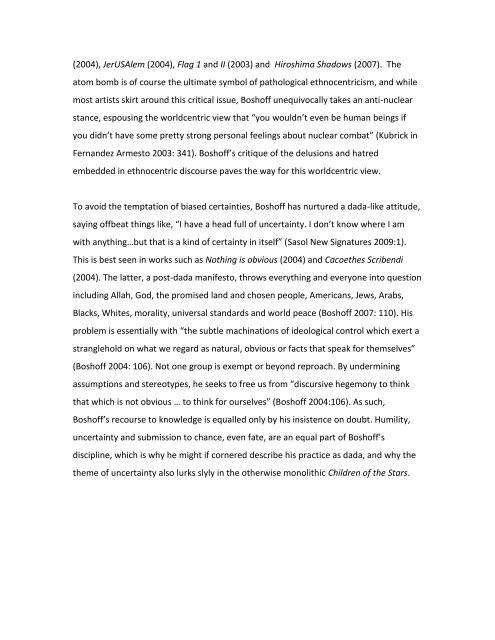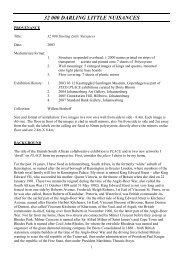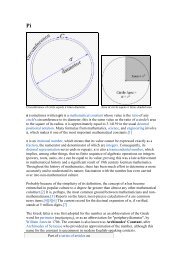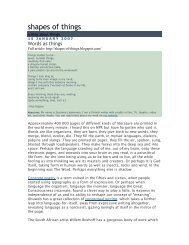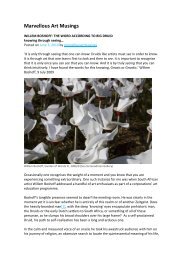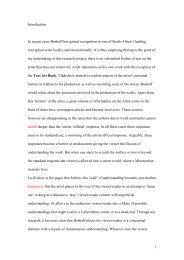Miranthe Staden Garbett Report - Willem Boshoff
Miranthe Staden Garbett Report - Willem Boshoff
Miranthe Staden Garbett Report - Willem Boshoff
Create successful ePaper yourself
Turn your PDF publications into a flip-book with our unique Google optimized e-Paper software.
(2004), JerUSAlem (2004), Flag 1 and II (2003) and Hiroshima Shadows (2007). The<br />
atom bomb is of course the ultimate symbol of pathological ethnocentricism, and while<br />
most artists skirt around this critical issue, <strong>Boshoff</strong> unequivocally takes an anti-nuclear<br />
stance, espousing the worldcentric view that “you wouldn’t even be human beings if<br />
you didn’t have some pretty strong personal feelings about nuclear combat” (Kubrick in<br />
Fernandez Armesto 2003: 341). <strong>Boshoff</strong>’s critique of the delusions and hatred<br />
embedded in ethnocentric discourse paves the way for this worldcentric view.<br />
To avoid the temptation of biased certainties, <strong>Boshoff</strong> has nurtured a dada-like attitude,<br />
saying offbeat things like, “I have a head full of uncertainty. I don’t know where I am<br />
with anything…but that is a kind of certainty in itself” (Sasol New Signatures 2009:1).<br />
This is best seen in works such as Nothing is obvious (2004) and Cacoethes Scribendi<br />
(2004). The latter, a post-dada manifesto, throws everything and everyone into question<br />
including Allah, God, the promised land and chosen people, Americans, Jews, Arabs,<br />
Blacks, Whites, morality, universal standards and world peace (<strong>Boshoff</strong> 2007: 110). His<br />
problem is essentially with “the subtle machinations of ideological control which exert a<br />
stranglehold on what we regard as natural, obvious or facts that speak for themselves”<br />
(<strong>Boshoff</strong> 2004: 106). Not one group is exempt or beyond reproach. By undermining<br />
assumptions and stereotypes, he seeks to free us from “discursive hegemony to think<br />
that which is not obvious … to think for ourselves” (<strong>Boshoff</strong> 2004:106). As such,<br />
<strong>Boshoff</strong>’s recourse to knowledge is equalled only by his insistence on doubt. Humility,<br />
uncertainty and submission to chance, even fate, are an equal part of <strong>Boshoff</strong>’s<br />
discipline, which is why he might if cornered describe his practice as dada, and why the<br />
theme of uncertainty also lurks slyly in the otherwise monolithic Children of the Stars.


